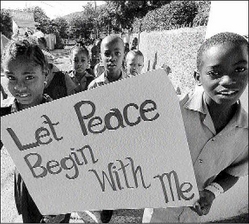UWI NOTEBOOK - UWI launches township scholarships
Published: Sunday | October 4, 2009

Ricardo Makyn/Staff Photographer
Students of August Town Primary School in St Andrew, march along the August Town main road as they participate in Peace Day celebrations last year.
The University of the West Indies (UWI), Mona, launched its University Township Scholarship on Wednes-day, September 30, at the Bryce Hill Plaza in August Town, St Andrew. Eight undergraduate students who reside in the Greater August Town community were presented with scholarships tenable at the Mona campus.
The recipients are Jevoun Huffstead, Davina Laylor, Shenhaye Ferguson, Shakera Grant, Sandel Rowe, Tanisha Rudd, Robert Campbell and Serona Gordon.
This tuition scholarship is granted to any resident of Greater August Town who matriculates to read for a bachelor's degree on the Mona campus of the UWI and is tenable without further condition for the first semester of the first year. Thereafter, in order to retain the full scholarship, the student must maintain a B+ average or a cumulative GPA of 3.3 or higher.
The scholarship is one of the initiatives of the University Township Project. This project, under the leadership of Principal and Pro Vice-Chancellor Professor Gordon Shirley, seeks to foster a better relationship between the UWI, Mona, and the Greater August Town community by engaging in a more meaningful and collaborative partnership with members of the community, the private sector and other stakeholders. The objectives are to help in crime reduction and prevention in the community, to make the Mona Bowl (for both campus and community) a centre of excellence in education and contribute to the overall development of August Town by increasing its social and intellectual capital.
crime is one of the biggest challenges facing Jamaica. The extent to which children are the victims of these crimes is something that lecturer in social work in the Department of Sociology, Psycho-logy and Social Work, and founder and coordinator of the Violence Prevention Programme at the University of the West Indies, Mona, Dr Claudette Crawford-Brown, has been investigating for the last 10 years. She was prompted to do this by to the increasing prevalence of children becoming victims as well as perpetrators of violence in Jamaica.
What natural or nurturing factors influence children and adolescents to become criminals in adulthood? The study looked at the family and community factors and other issues which caused children to develop criminal tendencies. Family factors were the absence of mother, little or no contact with mother, little or no contact with father and instability in parenting arrangements such as the child being moved from relative to relative, or from a relative's home to the streets.
Negative role models
Community factors identified were contact with gang members and contact with negative role models. Other factors included the severity of a child's behavioural problems and whether or not he/she receives counselling or other forms of assistance.
These factors can assist professionals working with children in the Caribbean to identify the children most at risk for developing criminal behaviour.
The study tested the effectiveness of various forms of counselling and other strategies designed to reduce behavioural problems. Some strategies that were found to be effective among the Jamaican children investigated were art and play therapy; mentorship, including big brother/big sister partnerships; street theatre and role play using puppets.
Classic responses
Two main categories of reactions to violence were observed. One group of children displayed the classic responses to violence - aggression, withdrawal, depression and anxiety. The second, and of greater concern, were the children who appeared to exhibit no observable reaction, dubbed by the researcher the 'a nuh nutten syndrome'. The concern is grounded in the reality that these children's reaction suggests that the violence they witness or experience has no consequence. This attitude to violence has serious implications for their ability to function appropriately in the society.
A range of violence prevention tools such as workbooks, posters, story books and manuals, has been produced from this study for children age 5-17 years. United Nations Children's Fund has undertaken to train professionals in the use of these tools and to distribute them in schools across the island.
A textbook entitled Children in the Line of Fire; the Impact of Violence and Trauma on Children and Families in Jamaica has also been produced from this study.
